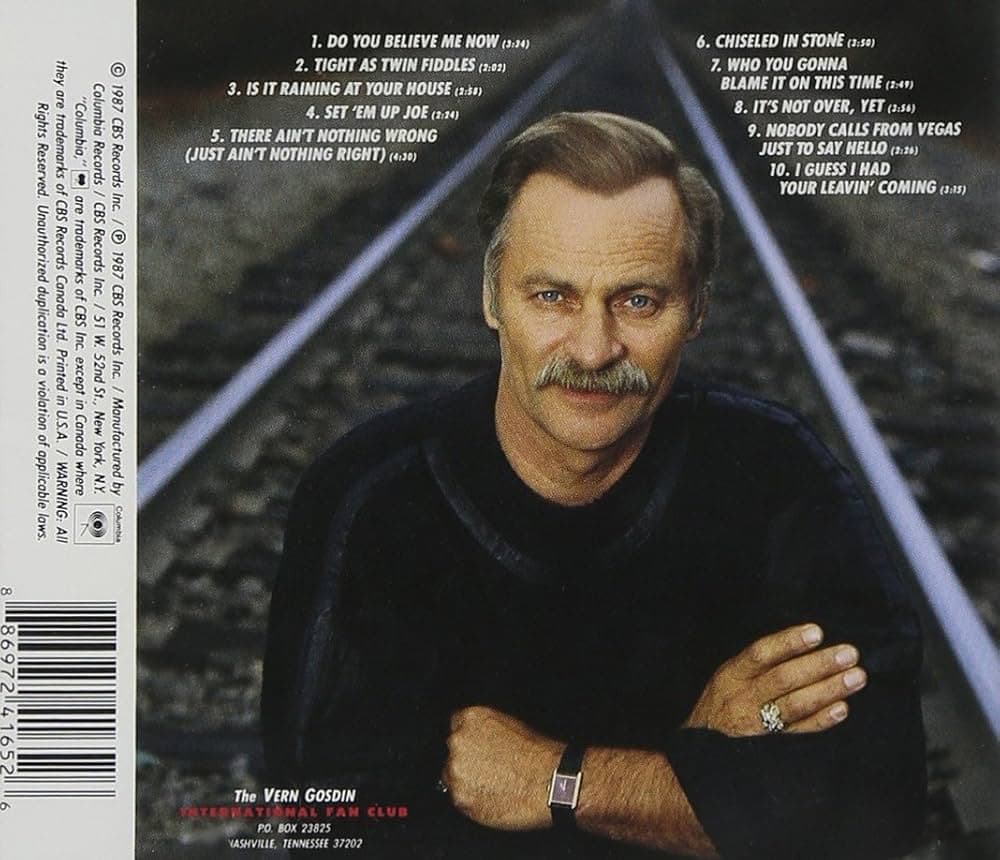
A Heartbreaking Testament to Love’s Enduring, Painful Legacy
Let’s pause for a moment and journey into the deeper currents of country music, where the rawest emotions are often conveyed with a profound, almost aching sincerity. In this realm, few voices carried the weight of experience and heartbreak quite like Vern Gosdin. Known affectionately as “The Voice,” his rich, resonant baritone could convey more sorrow and resilience in a single note than many could in an entire song. Today, we’re reflecting on a masterpiece from his remarkable career, a ballad that cuts straight to the bone with its stark honesty about lost love: “Chiseled In Stone.”
“Chiseled In Stone” was released in 1988, a period when Vern Gosdin was experiencing a resurgence in his career, finding an appreciative audience for his traditional country sound amidst the genre’s evolving landscape. This incredibly powerful track was the title track from his album “Chiseled In Stone,” an album that became a critical and commercial triumph for Gosdin. As a single, “Chiseled In Stone” was a monumental success, soaring to number 1 on the Billboard Hot Country Singles chart in early 1989. This chart-topping achievement cemented its status as one of Gosdin’s signature songs and a modern country classic. The album itself also performed exceptionally well, receiving widespread acclaim for its authentic country sound and Gosdin’s powerful vocal delivery. Its impact resonated deeply, earning Gosdin the CMA Award for Single of the Year in 1989 and becoming a benchmark for songs of profound emotional depth in country music.
The poignant story behind “Chiseled In Stone” comes from the collaborative genius of Vern Gosdin himself and Max D. Barnes. Both were seasoned songwriters known for their ability to craft narratives steeped in real-life emotion. The inspiration for the song reportedly arose from a conversation where Gosdin was contemplating the permanence of certain feelings, even after a relationship has ended. The idea of feelings being “chiseled in stone” — an unchangeable, indelible mark — became the central metaphor. Barnes and Gosdin then constructed the narrative around a poignant conversation with an elderly man at a bar, who offers a stark, heartbreaking truth about life’s greatest regret: taking love for granted. It’s a beautifully crafted piece of storytelling, where a simple barroom exchange unlocks profound universal wisdom about love, loss, and regret. Gosdin’s own life, marked by personal struggles and heartbreaks, undoubtedly informed his ability to deliver the song with such raw, believable emotion.
The meaning of “Chiseled In Stone” is a sobering, yet deeply emotional, reflection on the lasting pain of squandered love and the irreversible nature of past mistakes in a relationship. The song centers on a conversation where an older, seemingly wise man offers a devastating piece of advice: “You’ll never know how much it hurts to see / Those simple words, chiseled in stone, ‘He loved her, and he lost her, and he never loved again.'” These lines convey the bitter regret of someone who recognizes too late the preciousness of what they had, and the permanent scar left by its loss. It speaks to the idea that some truths, particularly about love and regret, become etched into our very being, unchangeable and unerasable, much like words carved into stone. For older listeners, this song strikes a particularly resonant chord. It taps into the shared human experience of retrospection, acknowledging those moments when we realize the true value of something only after it’s gone, and the enduring weight of regrets that can never truly be lifted. It’s a stark reminder that true love, once lost due to negligence, leaves a void that no amount of wishing can fill.
Listening to “Chiseled In Stone” today is an incredibly moving experience. Vern Gosdin’s vocal performance is simply masterful; his voice is thick with genuine sorrow, resignation, and a profound sense of lament. The simple, traditional country arrangement, featuring steel guitar and fiddle, perfectly complements the raw emotion of the lyrics, never distracting but always enhancing the narrative. There’s a sparseness to the production that allows every word, every inflection of Gosdin’s voice, to cut deep. It transports us to a quiet, contemplative place, perhaps a dimly lit bar, where life’s hard truths are shared between weary souls. It’s not just a country song; it’s a timeless human story, a testament to the fact that some lessons, especially those about love and appreciation, are learned with a pain so deep that they become, indeed, “chiseled in stone” on the heart. It’s a powerful piece that continues to evoke profound memories and reflections for anyone who has loved and lost.